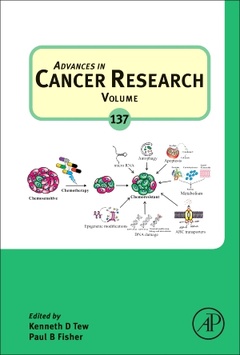Description
Advances in Cancer Research
Directors of collection: Tew Kenneth D., Fisher Paul B.
Language: English
Subjects for Advances in Cancer Research:
Keywords
<; p>; Cancer; oncology; RNA; microRNA; gene expression; nucleotide; transcription; gene silence<; /p>
Support: Print on demand
Description
/li>Contents
/li>Readership
/li>Biography
/li>Comment
/li>
Advances in Cancer Research, Volume 137, the latest release in this ongoing, well-regarded serial provides invaluable information on the exciting and fast-moving field of cancer research. This volume presents original reviews on research bridging oncology and gene expression, with this volume covering unconventional approaches to modulating the immunogenicity of tumor cells, tumor dormancy and immunoediting, the emerging role of anti-apoptotic Bcl-2 family proteins in chemoresistance, Beclin-1 and autophagy, MDA-7/IL-24, and nanotechnology and medicine.
1. Unconventional approaches to modulating the immunogenicity of tumor cellsPaul Dent2. Tumor dormancy and immunoeditingMasoud H. Manjili3. Emerging role of anti-apoptotic Bcl-2 family proteins in chemoresistanceRupesh Dash4. Beclin-1 and AutophagyPaul Fisher5. Nanotechnology and MedicineRajagopal Ramesh6. PENDING TITLEMonica Valentovic
Researchers and students in the basic and clinical sciences of cancer biology and oncology, plus related areas in genetics, immunology, pharmacology, cell biology, and molecular biology.
The Tew laboratory maintains an interest in using redox pathways as a platform to develop therapeutic strategies through drug discovery/development and biomarker identification. We interrogate how reactive oxygen and nitrogen species (ROS/RNS) impact cancer cells and develop novel drugs that impact on glutathione based pathways. Our research efforts have been integral to studies that have identified glutathione S-transferases (GST) as important in drug resistance, catalytic detoxification and as arbiters of kinase-mediated cell signaling events. In addition, we have been instrumental in defining how GSTP contributes to the process by which cells respond to ROS by selective addition of glutathione to specific protein clusters, so called S-glutathionylation. Each of these research areas has had broad impact on a number of cancer disciplines. Moreover, we have also been seminally involved in the Phase I to III clinical testing of three oncology drugs, Telcyta, Telintra and NOV-002. Other ongoing translational efforts have produced two ongoing clinical trials to measure the effectiveness of serum S-glutathionylated serine proteinase inhibitors as possible biomarkers for exposure to hydrogen peroxide mouthwashes and radiation.
Paul B. Fisher, MPh, PhD, FNAI, Professor and Chairman, Department of Human and Molecular Genetics, Director, VCU Institute of Molecular Medicine Thelma Newmeyer Corman Chair in Cancer Research in the VCU Massey Cancer Center, VCU, School of Medicine, Richmond, VA, and Emeritus Professor, Columbia University, College of Physicians & Surgeons, New York, NY. Dr. Fisher is among the top 10% of NIH funded investigators over the past 35-years, published approximately 625 papers and reviews, and has 55 issued patents. He pioneered novel gene/discovery approaches (subtraction hybridization), developed innovativ
- Provides information on cancer research
- Offers outstanding and original reviews on a range of cancer research topics
- Serves as an indispensable reference for researchers and students alike




